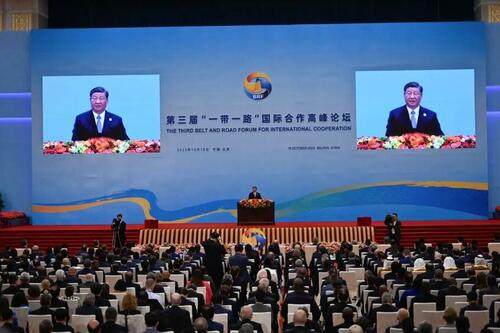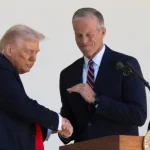
Authored by Julie Hartman via The Epoch Times,
Last week saw a subtle but portentous development. China hosted a global gathering of over 140 countries—70 percent of the world’s nations—in Beijing to commemorate the 10th anniversary of China’s Belt and Road Initiative (BRI). Not on the guest list: the United States, most NATO member nations, and other American allies such as Israel, Japan, South Korea, and, of course, Taiwan.
The world continues to focus on, and reel from, events in Israel and Gaza. Thus, many people will ignore or shrug at the news of this convocation. They see no connection between the Beijing meeting and the burgeoning Middle East disaster.
They should reconsider. With the Chinese Communist Party (CCP), few things happen merely by coincidence. Beijing’s hosting of more than 140 invitees may be related, in timing and perhaps more, to the recent surprise assault on Israel. Many lament Israel’s “intelligence failure” but do not contemplate the more sinister explanation: an intelligence penetration. Are Mossad and Shin Bet somehow immune from harboring a Kim Philby, an Aldrich Ames, or a Robert Hanssen? The New York Times reported on Oct. 13 that Hamas had “extraordinary awareness of Israel’s secrets and weaknesses.” From whom?
Many point the finger at Iran, which is using Hamas as its catspaw to bait its mortal enemy into warfare. But an event this momentous—one of the world’s most advanced and alert countries caught off-guard, suffering 1,400 fatalities, some multiple of that injured, approximately 155 hostages, and the prospect of an imminent bloodbath in Gaza—is unlikely to be a solo opus by a single Jew-hating country. Especially when we know who this Jew-hating country’s criminal associates are.
It is possible that Iran, though fully culpable, is a willing participant in a wider, deeper scheme, perhaps conceived, but almost certainly known and approved elsewhere.
As the Romans asked to identify responsibility for some unexplained event: Cui bono? Translation: Who benefits?
The answer: China.
Of course, manufacturing another disaster that the West must manage and respond to is optimal for China, and its agent Russia, especially as the CCP’s irredentist lust for Taiwan and Vladimir Putin’s stalemated war of attrition in Ukraine requires distracting their opponents. But the CCP's ultimate objective in their likely hand in the Oct. 7 pogrom is to sow division and chaos between Western and non-Western countries, and within those individual national populations, to steer geopolitics toward hegemony by China. Since the 1990s, China, recruiting Russia and Iran as its accomplices, has undertaken a multi-pronged, multi-layered, multi-decade strategy to accomplish this, a central feature of which is to conceal that it is happening at all.
First, China seeks to co-opt nations by “investing” in their infrastructure and institutions, from building railway lines in Bogota and Tehran to a university in Budapest (or, in the case of the United States, spreading around lucrative "business opportunities" to performing troupes of well-placed politicians). How ironic that almost all these countries had representatives in Beijing to celebrate their neo-colonization by the CCP under the BRI. Uhuru! Not so much.
Like a lustful bachelor assaying and cultivating prospects, China also grooms a roster of mostly third-world, "non-aligned" countries that are Western-alternative-curious, countries possibly seeking an "arrangement" (with China as the benefactor) in addition to, or instead of, the one they have now with the United States and its allies. Beijing can be very persuasive in these flirtations. "America doesn't appreciate you. You deserve better. The United States can't give you what you want anymore," the CCP softly whispers, promising danger and adventure, not stodgy, unsatisfying predictability.
Last year, Xi Jinping launched the Global Security Initiative to apply “Chinese solutions and wisdom” to world politics and combat Western “unilateralism, bloc confrontation, and hegemonism.” In a visit with Mr. Putin last March, the Russian president said that China and Russia are driving “changes that haven’t happened in 100 years.” In July, Iran joined Russia and gained full membership in the Shanghai Cooperation Organization, a Chinese-founded political alliance group of non-Western countries. Also in July, President Ebrahim Raisi of Iran vowed to combat “Western hegemonic powers” by reshaping the international system to “remove” the dominance of the dollar. In August, Iran also joined BRICS—an economic, China-led and Russia-membered alliance of non-Western countries with the goal of combating Western spheres of power. BRICS members, which also now include Saudi Arabia, Egypt, and the United Arab Emirates, comprise over a third of the global GDP.
China is also stepping into the role, occupied since 1945 by the United States, of broker and mediator of international conflicts and disputes. Earlier this year, China helped negotiate a rapprochement between sworn enemies Saudi Arabia and Iran, which China's top diplomat Wang Yi lauded as China's successful “casting off external influences" in the Middle East. So one wonders how the CCP may have reacted when, two weeks before Hamas's attack, Israeli Prime Minister Benjamin Netanyahu, on a visit to Saudi Arabia, said that it was likely that Israel and Saudi Arabia would enter their own diplomatic agreement in the coming weeks, a development building on the Abraham Accords that Mr. Netanyahu predicted would “change the Middle East forever.” China does not want to see Saudi-Israeli relations become normalized and work together outside of its sphere.
And now, with China's economy sputtering as its population ages and declines, the next phase of the strategy of the CCP on its shrinking timetable of global hegemony may be diminishing and dividing its opponents—in particular, NATO, the bedrock institution to secure international order since 1945. China is keenly aware that a potent accelerant to fracture these nations’ populations would be graphic footage of a streamed-online-in-real-time war in Gaza, featuring house-to-house urban warfare on a scale not occurring since Stalingrad, as well as the resultant refugee catastrophe that will likely accompany and follow the war.
Just 10 days after Israel was attacked, China has now convened more than 140 countries, pointedly not inviting the United States and its closest allies. Those in attendance were feted, flattered, bribed, seduced, and dazzled by a program showcasing China’s ascension and vitality and the West’s decline, division, and irrelevance—a dystopian 2023 World's Fair portending a grim future of supine servitude, or worse, for those who do not fall into line, especially those not on the guest list.
Cui bono, indeed.
Authored by Julie Hartman via The Epoch Times,
Last week saw a subtle but portentous development. China hosted a global gathering of over 140 countries—70 percent of the world’s nations—in Beijing to commemorate the 10th anniversary of China’s Belt and Road Initiative (BRI). Not on the guest list: the United States, most NATO member nations, and other American allies such as Israel, Japan, South Korea, and, of course, Taiwan.
The world continues to focus on, and reel from, events in Israel and Gaza. Thus, many people will ignore or shrug at the news of this convocation. They see no connection between the Beijing meeting and the burgeoning Middle East disaster.
They should reconsider. With the Chinese Communist Party (CCP), few things happen merely by coincidence. Beijing’s hosting of more than 140 invitees may be related, in timing and perhaps more, to the recent surprise assault on Israel. Many lament Israel’s “intelligence failure” but do not contemplate the more sinister explanation: an intelligence penetration. Are Mossad and Shin Bet somehow immune from harboring a Kim Philby, an Aldrich Ames, or a Robert Hanssen? The New York Times reported on Oct. 13 that Hamas had “extraordinary awareness of Israel’s secrets and weaknesses.” From whom?
Many point the finger at Iran, which is using Hamas as its catspaw to bait its mortal enemy into warfare. But an event this momentous—one of the world’s most advanced and alert countries caught off-guard, suffering 1,400 fatalities, some multiple of that injured, approximately 155 hostages, and the prospect of an imminent bloodbath in Gaza—is unlikely to be a solo opus by a single Jew-hating country. Especially when we know who this Jew-hating country’s criminal associates are.
It is possible that Iran, though fully culpable, is a willing participant in a wider, deeper scheme, perhaps conceived, but almost certainly known and approved elsewhere.
As the Romans asked to identify responsibility for some unexplained event: Cui bono? Translation: Who benefits?
The answer: China.
Of course, manufacturing another disaster that the West must manage and respond to is optimal for China, and its agent Russia, especially as the CCP’s irredentist lust for Taiwan and Vladimir Putin’s stalemated war of attrition in Ukraine requires distracting their opponents. But the CCP’s ultimate objective in their likely hand in the Oct. 7 pogrom is to sow division and chaos between Western and non-Western countries, and within those individual national populations, to steer geopolitics toward hegemony by China. Since the 1990s, China, recruiting Russia and Iran as its accomplices, has undertaken a multi-pronged, multi-layered, multi-decade strategy to accomplish this, a central feature of which is to conceal that it is happening at all.
First, China seeks to co-opt nations by “investing” in their infrastructure and institutions, from building railway lines in Bogota and Tehran to a university in Budapest (or, in the case of the United States, spreading around lucrative “business opportunities” to performing troupes of well-placed politicians). How ironic that almost all these countries had representatives in Beijing to celebrate their neo-colonization by the CCP under the BRI. Uhuru! Not so much.
Like a lustful bachelor assaying and cultivating prospects, China also grooms a roster of mostly third-world, “non-aligned” countries that are Western-alternative-curious, countries possibly seeking an “arrangement” (with China as the benefactor) in addition to, or instead of, the one they have now with the United States and its allies. Beijing can be very persuasive in these flirtations. “America doesn’t appreciate you. You deserve better. The United States can’t give you what you want anymore,” the CCP softly whispers, promising danger and adventure, not stodgy, unsatisfying predictability.
Last year, Xi Jinping launched the Global Security Initiative to apply “Chinese solutions and wisdom” to world politics and combat Western “unilateralism, bloc confrontation, and hegemonism.” In a visit with Mr. Putin last March, the Russian president said that China and Russia are driving “changes that haven’t happened in 100 years.” In July, Iran joined Russia and gained full membership in the Shanghai Cooperation Organization, a Chinese-founded political alliance group of non-Western countries. Also in July, President Ebrahim Raisi of Iran vowed to combat “Western hegemonic powers” by reshaping the international system to “remove” the dominance of the dollar. In August, Iran also joined BRICS—an economic, China-led and Russia-membered alliance of non-Western countries with the goal of combating Western spheres of power. BRICS members, which also now include Saudi Arabia, Egypt, and the United Arab Emirates, comprise over a third of the global GDP.
China is also stepping into the role, occupied since 1945 by the United States, of broker and mediator of international conflicts and disputes. Earlier this year, China helped negotiate a rapprochement between sworn enemies Saudi Arabia and Iran, which China’s top diplomat Wang Yi lauded as China’s successful “casting off external influences” in the Middle East. So one wonders how the CCP may have reacted when, two weeks before Hamas’s attack, Israeli Prime Minister Benjamin Netanyahu, on a visit to Saudi Arabia, said that it was likely that Israel and Saudi Arabia would enter their own diplomatic agreement in the coming weeks, a development building on the Abraham Accords that Mr. Netanyahu predicted would “change the Middle East forever.” China does not want to see Saudi-Israeli relations become normalized and work together outside of its sphere.
And now, with China’s economy sputtering as its population ages and declines, the next phase of the strategy of the CCP on its shrinking timetable of global hegemony may be diminishing and dividing its opponents—in particular, NATO, the bedrock institution to secure international order since 1945. China is keenly aware that a potent accelerant to fracture these nations’ populations would be graphic footage of a streamed-online-in-real-time war in Gaza, featuring house-to-house urban warfare on a scale not occurring since Stalingrad, as well as the resultant refugee catastrophe that will likely accompany and follow the war.
Just 10 days after Israel was attacked, China has now convened more than 140 countries, pointedly not inviting the United States and its closest allies. Those in attendance were feted, flattered, bribed, seduced, and dazzled by a program showcasing China’s ascension and vitality and the West’s decline, division, and irrelevance—a dystopian 2023 World’s Fair portending a grim future of supine servitude, or worse, for those who do not fall into line, especially those not on the guest list.
Cui bono, indeed.
Loading…






